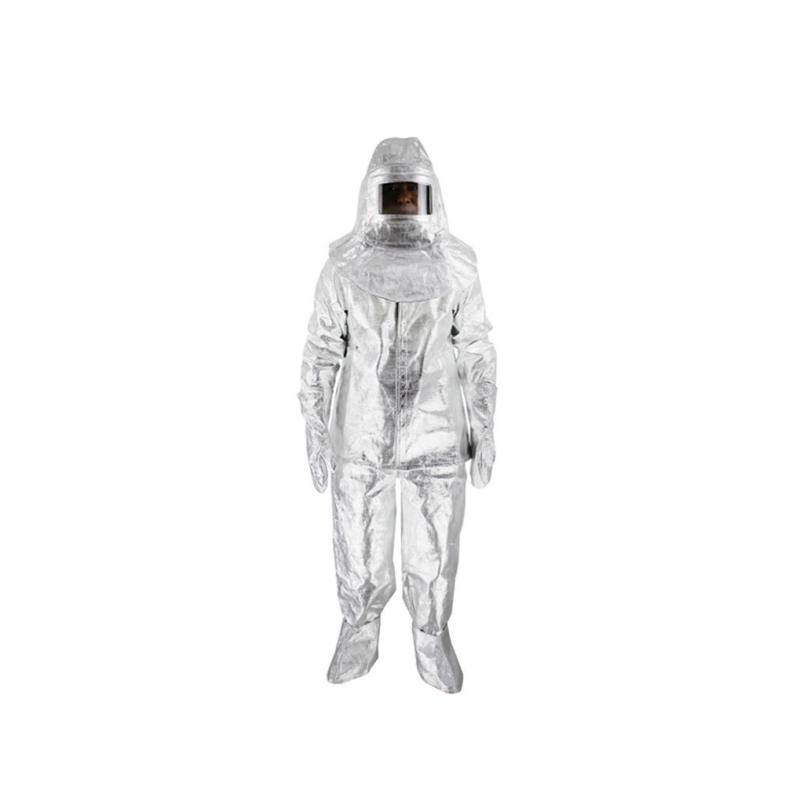Fiberglass Silica Anti Emergency Fire Blanket
Cat:Fire Blanket
The Fiberglass Silica Anti Emergency Fire Blanket is a type of fire safety equipment designed to extinguish small fires or provide protection against ...
See DetailsCool and Dry Environment: Store the fire-resistant suit in an environment where the temperature is consistently controlled. Avoid extreme temperatures, as both high heat and extreme cold can negatively impact the materials. The ideal temperature range is between 10°C to 25°C (50°F to 77°F). Fluctuations outside this range can cause the aluminum foil and underlying materials to expand, contract, or degrade over time. Maintain a low relative humidity in the storage area, ideally below 50%. High humidity levels can lead to corrosion of the aluminum foil and promote the growth of mold or mildew, which can compromise the suit’s effectiveness. Utilize dehumidifiers or air conditioning systems if necessary to control moisture levels.
Avoid Chemical Exposure: Ensure that the storage area is isolated from any chemicals, including cleaning agents, solvents, acids, and other reactive substances. Even minimal exposure to such chemicals can lead to degradation of the fire-resistant materials. Store the suit in a dedicated area away from industrial chemicals, maintenance supplies, or areas where chemical spills might occur. Verify that no chemical residue or vapors are present in the storage area. Use non-reactive storage solutions, such as polypropylene or polyethylene containers, which do not interact with the suit’s materials.
Clean Storage Area: Regularly clean the storage area to remove dust, dirt, and other particulate matter that could damage the suit. Use vacuums or clean cloths to ensure that the environment remains free from contaminants. Regular cleaning schedules help maintain a pristine environment and prevent accidental contamination. Ensure that storage surfaces, such as shelves or hooks, are smooth and free from sharp edges or protrusions. Abrasive or uneven surfaces can cause physical damage to the suit when it is stored or retrieved.
Proper Hanging or Folding: If the suit is to be hung, use padded or smooth, non-abrasive hangers to prevent deformation. Avoid using wire hangers or hangers with sharp edges that could cause indentations or tears in the suit. Ensure the hanger is robust enough to support the suit’s weight without causing sagging or distortion. If the suit must be folded, follow the manufacturer’s specific instructions to prevent damage. Use clean, soft materials between folds to cushion the suit and reduce the risk of creasing. Avoid sharp folds or excessive bending that could impact the suit’s structural integrity.
Protective Covering: Use a protective cover made from breathable, non-reactive material to shield the suit from environmental contaminants. The cover should be designed to allow airflow to prevent the buildup of moisture, which can lead to mold growth. Ensure that the cover is clean and free from any chemicals or dyes that could transfer onto the suit. If using storage containers, select ones that are lined with non-abrasive materials and have secure closures to protect the suit from dust and pests. Avoid containers that could trap moisture or heat.
Avoid Sharp Objects: Design the storage area to be free from sharp or abrasive objects. This includes ensuring that shelving, hooks, or storage bins are smooth and do not have any edges that could damage the suit. Regularly inspect the storage area to remove any potential hazards. When handling the suit, be cautious to avoid contact with sharp objects or rough surfaces. Implement proper handling procedures to prevent accidental damage during retrieval or storage.
High Temperature Resistance Aluminium Foil Fire Resistant Suit
